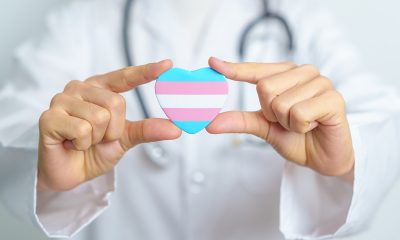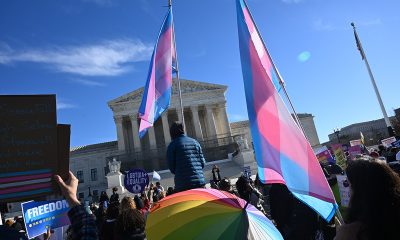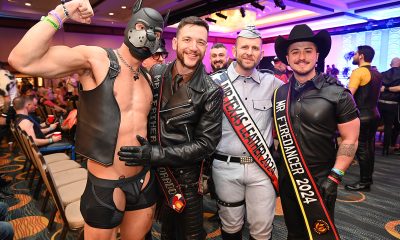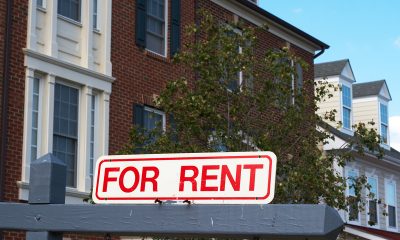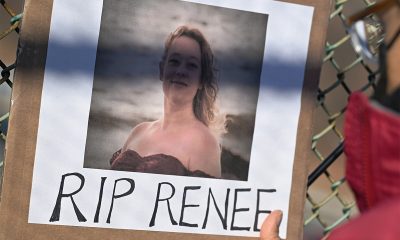District of Columbia
Two prominent LGBTQ candidates drop out of race for ANC seats
Musa, Rangel among 46 hit with signature petition challenges
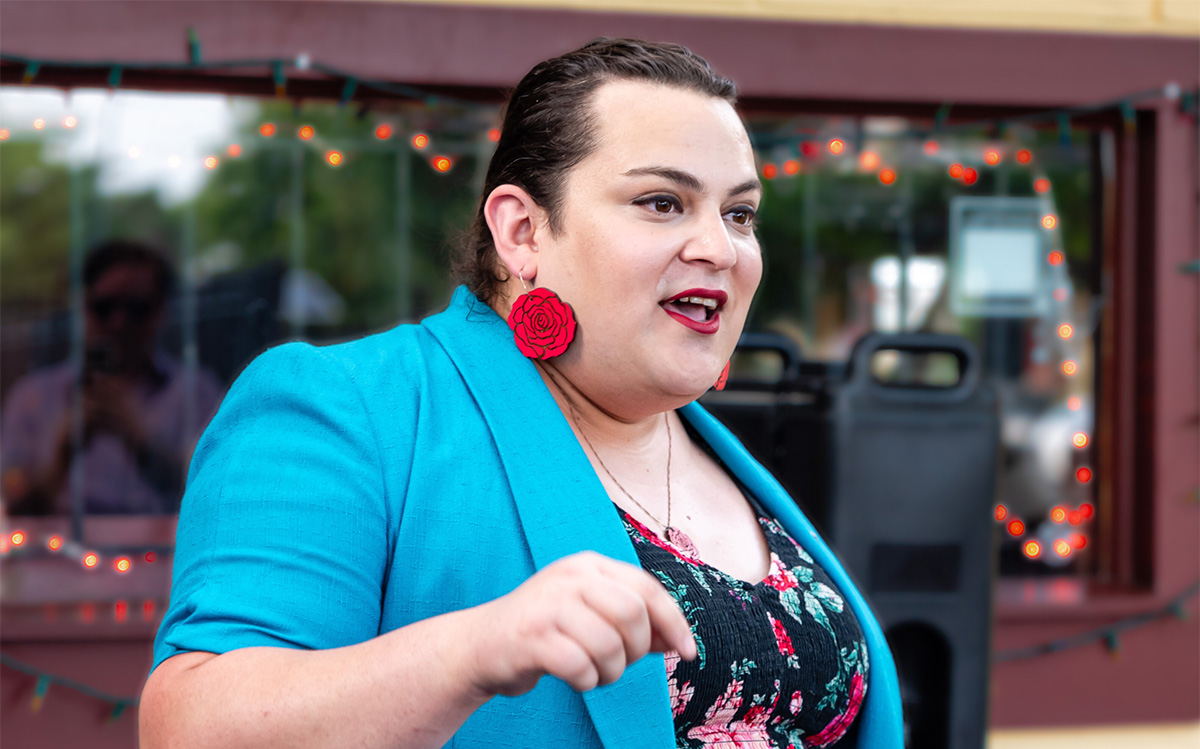
D.C. Capital Pride Alliance board member Anthony Musa and transgender D.C. government official Vida Rangel have withdrawn as candidates in the city’s Nov. 5 election for Advisory Neighborhood Commission seats after separate challenges were filed questioning the validity of the signatures on their required nominating petitions.
Musa was one of at least four LGBTQ candidates running unopposed for seats on ANC 2B, which represents the Dupont Circle neighborhood.
Rangel, who described herself as the first Latina trans person of color to run for public office in D.C., was running for the ANC single member district seat 1A10 in the city’s Columbia Heights neighborhood. She was running against incumbent Billy Easley, who identifies as a gay man. Rangel currently serves as director of operations for the D.C. Mayor’s Office of Talent and Appointments.
Under D.C. election rules, ANC candidates must obtain the signatures of at least 25 registered voters who live in their ANC single member district to gain access to the election ballot. Under the D.C. government, ANCs are unpaid, voluntary elected positions given the role of advising city government officials on neighborhood issues, with city officials required to give “great weight” to the ANCs’ recommendations.
Musa told the Washington Blade on Sept. 3 that he withdrew his candidacy after realizing he only obtained about 26 or 27 signatures, with a few of them appearing to be from people who did not live in his ANC single member district 2B01. He said the person challenging his petition, whom he called a neighborhood rival, would likely have succeeded in the challenge and invalidated his candidacy.
“With the signatures, I just didn’t meet the level,” he said. “There were several people that I thought lived in my district, but they didn’t. So, if I ever do this again, I’ll make sure I get like triple the amount that I need.”
Rangel told the Blade on Sept. 4 that after receiving the challenge to her petition she too realized she fell short on the number of needed petition signatures. “After reviewing that challenge and checking records of what I could correct, I would have ended up coming just four signatures short,” she said. “So, in the end I decided to withdraw. It’s very disappointing.”
She said she also decided not to run for the ANC seat as a write-in candidate. “I think as a write-in I wouldn’t be anywhere as viable with my opponent Billy Easley running for re-election and with the name recognition he has,” Rangel said. “So, I think it’s best for me to step back and let him continue his service.”
Gay D.C. political activist Joe Bishop-Henchman filed the challenge against Rangel and seven other ANC candidates.
Bishop-Henchman disputed claims by some neighborhood activists who said he and others who challenged the signature petitions of ANC candidates were targeting those candidates because they disagreed with the candidates’ positions on issues impacting their respective neighborhoods. He insisted he only files challenges against “the candidate that says they have the 25 valid signatures but doesn’t.”
Vincent Slatt, who serves as chair of the ANC Rainbow Caucus, which includes LGBTQ ANC members from across the city, said he recognized the names of about three or four other LGBTQ ANC candidates whose petitions were also being challenged.
Slatt said he believes most of the challenges were “petty” and motivated by neighborhood political rivalries. He and Musa pointed out that the person who challenged Musa’s petition, Martha ‘Marcy’ Logan, serves on the board of directors of the Dupont Circle Citizens Association. Some Dupont Circle neighborhood activists, including LGBTQ activists, consider the organization, referred to as the DCCA, to be biased against nightlife businesses, including some of the gay bars in the Dupont Circle area.
Musa said he believes Logan targeted him for a petition challenge because she believes he sides with the nightlife businesses. He describes himself as a “pro-growth” advocate from a neighborhood business perspective as opposed to the DCCA, which Musa considers “anti-growth” regarding community businesses that he feels are an asset to the neighborhood.
The DCCA didn’t immediately respond to a request from the Blade for comment and for contact information for Logan.
Musa said he too decided not to run for the ANC seat as a write-in candidate. With his withdrawal from the race, there will be no candidate on the November election ballot for the 2ANC 2B01 seat.
At the time she announced her candidacy in July, Rangel said among her priorities as an ANC commissioner would be improving language access for the large number of Spanish-speaking residents in the Columbia Heights neighborhood.
“We need a commissioner who is going to push for Spanish language resources so that our government officials can hear the voices of all Columbia Heights residents, not just the ones who speak English,” she told the Blade.
District of Columbia
Ruby Corado sentenced to 33 months in prison
Former Casa Ruby director pleaded guilty to wire fraud in 2024
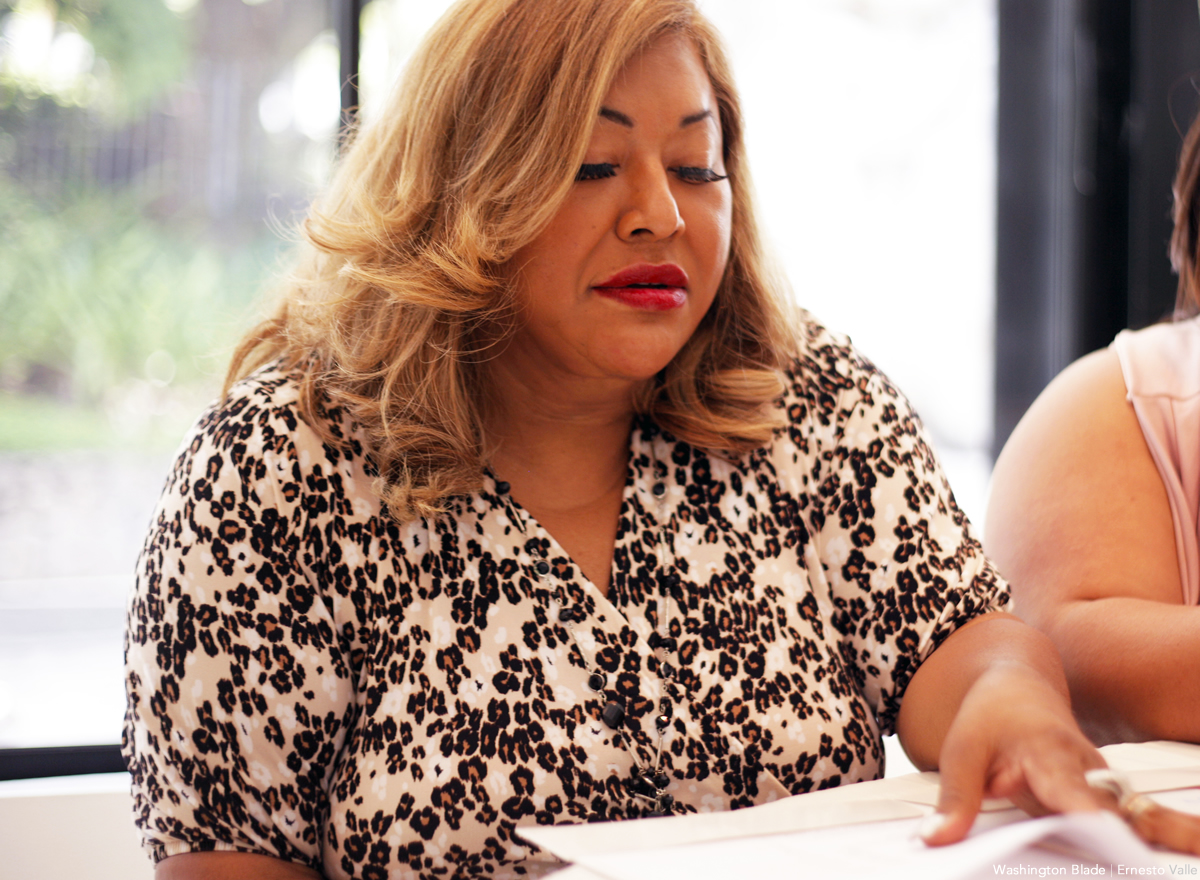
A federal judge on Jan. 13 sentenced Ruby Corado, the founder and former executive director of the now closed D.C. LGBTQ community services organization Casa Ruby, to 33 months of incarceration for a charge of wire fraud to which she pleaded guilty in July 2024.
U.S. District Court Judge Trevor M. McFadden handed down the sentence that had been requested by prosecutors with the Office of the U.S. Attorney for the District of Columbia after Corado’s sentencing had been postponed six times for various reasons.
The judge also sentenced her to 24 months of supervised release upon her completion of incarceration.
In addition to the sentence of incarceration, McFadden agreed to a request by prosecutors to hold Corado responsible for “restitution” and “forfeiture” in the amount of $956,215 that prosecutors have said she illegally misappropriated from federal loans obtained by Casa Ruby.
The charge to which she pleaded guilty is based on allegations that she diverted at least $180,000 “in taxpayer backed emergency COVID relief funds to private offshore bank accounts,” according to court documents.
Court records show FBI agents arrested Corado on March 5, 2024, at a hotel in Laurel, Md., shortly after she returned to the U.S. from El Salvador, where authorities say she moved in 2022. Prosecutors have said in charging documents that she allegedly fled to El Salvador, where she was born, after “financial irregularities at Casa Ruby became public,” and the LGBTQ organization ceased operating.
Shortly after her arrest, another judge agreed to release Corado into the custody of her niece in Rockville, Md., under a home detention order. But at an Oct. 14, 2025, court hearing at which the sentencing was postponed after Corado’s court appointed attorney withdrew from the case, McFadden ordered Corado to be held in jail until the time of her once again rescheduled sentencing.
Her attorney at the time, Elizabeth Mullin, stated in a court motion that her reason for withdrawing from the case was an “irreconcilable breakdown in the attorney-client relationship.”
Corado’s newly retained attorney, Pleasant Brodnax, filed a 25-page defense Memorandum in Aid of Sentencing on Jan. 6, calling for the judge to sentence Corado only to the time she had already served in detention since October.
Among other things, Brodnax’s defense memorandum disputes the claim by prosecutors that Corado improperly diverted as much as $956,215 from federally backed loans to Casa Ruby, saying the total amount Corado diverted was $200,000. Her memo also states that Corado diverted the funds to a bank account in El Salvador for the purpose of opening a Casa Ruby facility there, not to be used for her personally.
“Ms. Corado has accepted responsibility for transferring a portion of the loan disbursements into another account she operated and ultimately transferring a portion of the loan disbursements to an account in El Salvador,” the memo continues.
“Her purpose in transferring funds to El Salvador was to fund Casa Ruby programs in El Salvador,” it says, adding, “Of course, she acknowledges that the terms of the loan agreement did not permit her to transfer the funds to El Salvador for any purpose.”
In his own 16-page sentencing recommendation memo, Assistant U.S. Attorney John Borchert, the lead prosecutor in the case, said Corado’s action amounted at the least to fraud.
“The defendant and Casa Ruby received no less than $1.2 million in taxpayer backed funds during the COVID-19 global health crisis,” he memo states. “But rather than use those funds to support Casa Ruby’s mission as the defendant promised, the defendant further contributed to its demise by unlawfully transferring no less than $180,000 of these federal emergency relief funds into her own private offshore bank accounts,” it says.
“Then, when media reports suggested the defendant would be prosecuted for squandering Casa Ruby’s government funding, she sold her home and fled the country,” the memo states. “Meanwhile, the people who she had promised to pay with taxpayer-backed funds – her employees, landlord, and vendors – were left behind flat broke.”
A spokesperson for the U.S. Attorney’s office and Corado’s attorney didn’t immediately respond to a request from the Washington Blade for comment on the judge’s sentence.
“Ms. Corado accepts full responsibility for her actions in this case,” defense attorney Brodnax says in her sentencing memo. “She acknowledges the false statements made in the loan applications and that she used some of the money outside the United States,” it says.
“However, the money was still utilized for the same purpose and intention as the funds used in the United States, to assist the LGBTQ community,” it states. “Ms. Corado did not use the money to buy lavish goods or fund a lavish lifestyle.”
Brodnax also states in her memo that as a transgender woman, Corado could face abuse and danger in a correctional facility where she may be sent if sentenced to incarceration.
“Ruby Corado committed a crime, she is now paying the price,” said D.C. LGBTQ rights advocate Peter Rosenstein. “While it is sad in many ways, we must remember she hurt the transgender community with what she did, and in many ways they all paid for her crime.”
District of Columbia
Kennedy Center renaming triggers backlash
Artists who cancel shows threatened; calls for funding boycott grow

Efforts to rename the Kennedy Center to add President Trump’s name to the D.C. arts institution continue to spark backlash.
A new petition from Qommittee , a national network of drag artists and allies led by survivors of hate crimes, calls on Kennedy Center donors to suspend funding to the center until “artistic independence is restored, and to redirect support to banned or censored artists.”
“While Trump won’t back down, the donors who contribute nearly $100 million annually to the Kennedy Center can afford to take a stand,” the petition reads. “Money talks. When donors fund censorship, they don’t just harm one institution – they tell marginalized communities their stories don’t deserve to be told.”
The petition can be found here.
Meanwhile, a decision by several prominent musicians and jazz performers to cancel their shows at the recently renamed Trump-Kennedy Center in D.C. planned for Christmas Eve and New Year’s Eve has drawn the ire of the Center’s president, Richard Grenell.
Grenell, a gay supporter of President Donald Trump who served as U.S. ambassador to Germany during Trump’s first term as president, was named Kennedy Center president last year by its board of directors that had been appointed by Trump.
Last month the board voted to change the official name of the center from the John F. Kennedy Memorial Center For The Performing Arts to the Donald J. Trump And The John F. Kennedy Memorial Center For The Performing Arts. The revised name has been installed on the outside wall of the center’s building but is not official because any name change would require congressional action.
According to a report by the New York Times, Grenell informed jazz musician Chuck Redd, who cancelled a 2025 Christmas Eve concert that he has hosted at the Kennedy Center for nearly 20 years in response to the name change, that Grenell planned to arrange for the center to file a lawsuit against him for the cancellation.
“Your decision to withdraw at the last moment — explicitly in response to the Center’s recent renaming, which honors President Trump’s extraordinary efforts to save this national treasure — is classic intolerance and very costly to a non-profit arts institution,” the Times quoted Grenell as saying in a letter to Redd.
“This is your official notice that we will seek $1 million in damages from you for this political stunt,” the Times quoted Grenell’s letter as saying.
A spokesperson for the Trump-Kennedy Center did not immediately respond to an inquiry from the Washington Blade asking if the center still planned to file that lawsuit and whether it planned to file suits against some of the other musicians who recently cancelled their performances following the name change.
In a follow-up story published on Dec. 29, the New York Times reported that a prominent jazz ensemble and a New York dance company had canceled performances scheduled to take place on New Year’s Eve at the Kennedy Center.
The Times reported the jazz ensemble called The Cookers did not give a reason for the cancellation in a statement it released, but its drummer, Billy Hart, told the Times the center’s name change “evidently” played a role in the decision to cancel the performance.
Grenell released a statement on Dec. 29 calling these and other performers who cancelled their shows “far left political activists” who he said had been booked by the Kennedy Center’s previous leadership.
“Boycotting the arts to show you support the arts is a form of derangement syndrome,” the Times quoted him as saying in his statement.
District of Columbia
New interim D.C. police chief played lead role in security for WorldPride
Capital Pride says Jeffery Carroll had ‘good working relationship’ with organizers
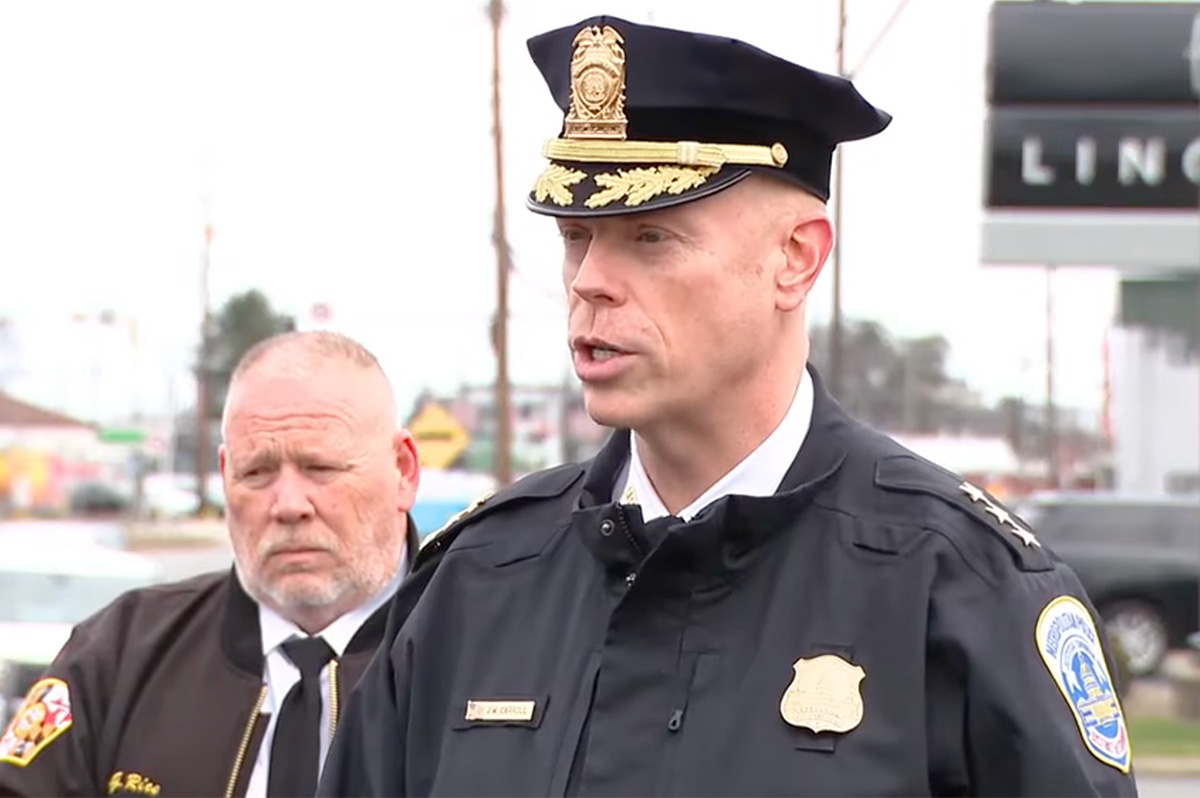
Jeffery Carroll, who was named by D.C. Mayor Muriel Bowser on Dec. 17 as the city’s Interim Chief of Police, played a lead role in working with local LGBTQ community leaders in addressing public safety issues related to WorldPride 2025, which took place in D.C. last May and June
“We had a good working relationship with him, and he did his job in relation to how best the events would go around safety and security,” said Ryan Bos, executive director of Capital Pride Alliance.
Bos said Carroll has met with Capital Pride officials in past years to address security issues related to the city’s annual Capital Pride parade and festival and has been supportive of those events.
At the time Bowser named him Interim Chief, Carroll had been serving since 2023 as Executive Assistant Chief of Specialized Operations, overseeing the day-to-day operation of four of the department’s bureaus. He first joined the D.C. Metropolitan Police Department in 2002 and advanced to multiple leadership positions across various divisions and bureaus, according to a statement released by the mayor’s office.
“I know Chief Carroll is the right person to build on the momentum of the past two years so that we can continue driving down crime across the city,” Bowser said in a statement released on the day she announced his appointment as Interim Chief.
“He has led through some of our city’s most significant public safety challenges of the past decade, he is familiar with D.C. residents and well respected and trusted by members of the Metropolitan Police Department as well as our federal and regional public safety partners,” Bowser said.
“We have the best police department in the nation, and I am confident that Chief Carroll will meet this moment for the department and the city,” Bowser added.
But Bowser has so far declined to say if she plans to nominate Carroll to become the permanent police chief, which requires the approval of the D.C. City Council. Bowser, who announced she is not running for re-election, will remain in office as mayor until January 2027.
Carroll is replacing outgoing Chief Pamela Smith, who announced she was resigning after two years of service as chief to spend more time with her family. She has been credited with overseeing the department at a time when violent crime and homicides declined to an eight-year low.
She has also expressed support for the LGBTQ community and joined LGBTQ officers in marching in the WorldPride parade last year.
But Smith has also come under criticism by members of Congress, who have accused the department of manipulating crime data allegedly showing lower reported crime numbers than actually occurred. The allegations came from the Republican-controlled U.S. House Oversight Committee and the U.S. Justice Department
Bowser has questioned the accuracy of the allegations and said she has asked the city’s Inspector General to look into the allegations.
Meanwhile, a spokesperson for the D.C. police Office of Public Affairs did not immediately respond to a question from the Washington Blade about the status of the department’s LGBT Liaison Unit. Sources familiar with the department have said a decline in the number of officers currently working at the department, said to be at a 50-year low, has resulted in a decline in the number of officers assigned to all of the liaison units, including the LGBT unit.
Among other things, the LGBT Liaison Unit has played a role in helping to investigate hate crimes targeting the LGBTQ community. As of early Wednesday an MPD spokesperson did not respond to a question by the Blade asking how many officers are currently assigned to the LGBT Liaison Unit.

